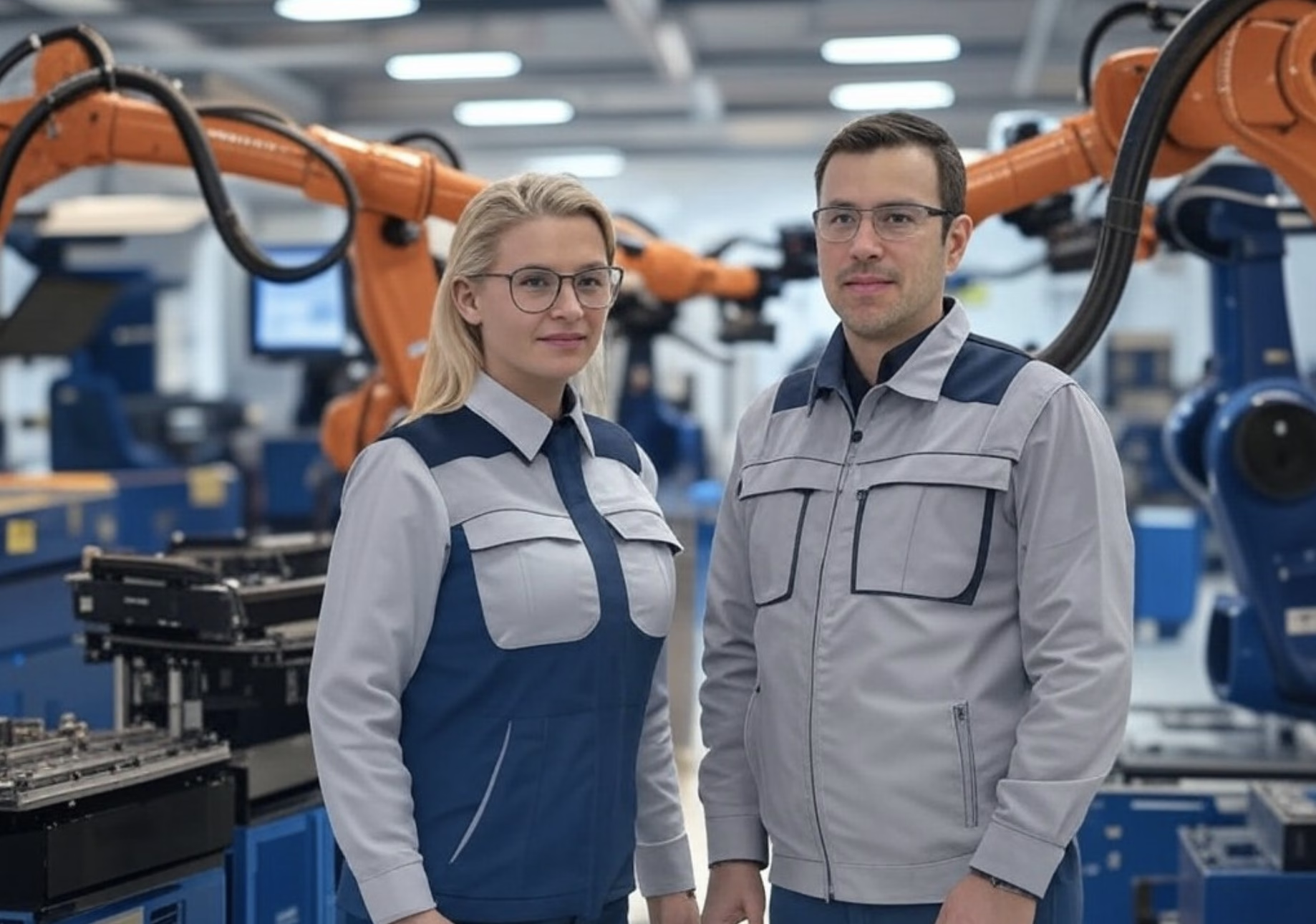Manufacturing has always been about efficiency and precision, but that is no longer enough. Customers now expect the same level of responsiveness and personalisation they experience in other industries. If your business still relies on outdated communication methods, it will be harder to keep customers engaged, manage expectations, and stay competitive. AI is already changing the way manufacturers build relationships: helping businesses anticipate needs, improve service, and create more meaningful interactions. The question is, are you making the most of it?
The growing disconnect between manufacturers and customers
Many manufacturers are struggling to keep up with changing customer expectations. A recent HubSpot report found that 93% of business leaders feel disconnected from their data, systems, internal teams, and customers. This disconnect is not just frustrating. It also slows response times, weakens relationships, and makes it harder to retain customers.
Operational efficiency has improved, but communication has not. Processes designed for predictable supply chains are now under pressure to be more adaptable and transparent. Customers want real-time information at every stage, whether they are tracking an order, requesting support, or looking for a tailored recommendation. If communication remains slow or disjointed, customers will look elsewhere.
For manufacturers shifting towards direct-to-customer models, these challenges are even greater. Without a clear engagement strategy, businesses risk falling behind as competitors build stronger, data-driven relationships with their customers.
For those shifting toward direct-to-customer models, the challenge is even greater. Effective engagement now requires a deeper understanding of customer needs, proactive issue resolution, and a seamless experience across every interaction. Companies that fail to modernise will struggle to stay relevant as competitors adopt smarter, more connected strategies. The impact of customer experience on profitability is clear. According to McKinsey, businesses that prioritise customer experience can double their revenue compared to those that do not. PwC reports that 73% of consumers say customer experience is a key factor in purchasing decisions, yet many businesses fail to meet expectations. As AI-driven strategies become more sophisticated, companies investing in technology to bridge the customer connection gap are gaining a competitive edge.
AI as a competitive advantage in customer engagement
AI is already helping manufacturers turn data into meaningful insights, making every interaction more relevant and efficient. Instead of reacting to issues, AI enables businesses to anticipate them. Predictive analytics is improving inventory management and reducing costly delays by forecasting demand more accurately. Rather than struggling with fragmented communication, AI-powered automation is helping teams respond faster, whether through chatbots that handle routine queries or workflows that streamline customer service. Businesses using AI in customer support are already seeing a 45% reduction in time spent on calls and faster issue resolution. AI also provides a deeper understanding of customer behaviour, helping manufacturers refine their product offerings and personalise interactions. With real-time insights, businesses can adjust strategies, offer tailored recommendations, and create a more seamless experience. The goal is not just efficiency, but stronger, long-term customer relationships. Reach out to us to discuss your options.
Putting AI into action: real-world applications
AI is already driving measurable improvements across manufacturing, helping businesses streamline operations and strengthen customer relationships. Companies that use AI to predict demand, personalise service, and automate processes are setting a new standard for engagement. We found some examples:
Predictive maintenance in industrial equipment
AI-driven monitoring systems are helping manufacturers predict machine failures before they happen. General Electric (GE) has integrated AI into its industrial operations, analysing sensor data from machinery to detect anomalies and schedule proactive maintenance. This reduces downtime, prevents costly failures, and builds trust with customers who rely on uninterrupted service.
Smarter inventory management
Siemens is using AI to optimise supply chains by forecasting demand more accurately and adjusting stock levels in real time. This ensures customers get the right products when they need them, preventing shortages and excess inventory. Businesses adopting AI-driven inventory management are cutting costs while improving fulfilment speed.
AI-powered quality control
BMW has integrated AI-powered visual inspection systems into its production lines. These systems analyse images in real time, detecting defects more accurately than human inspectors. This has helped BMW maintain high-quality standards while reducing waste and rework.
Personalisation in manufacturing
Czinger, an automotive manufacturer, is using AI to create highly customised sports cars based on customer preferences. AI helps analyse design possibilities, optimise performance, and deliver unique, tailored products—something that would have been nearly impossible with traditional manufacturing methods.
Sentiment analysis for customer feedback
Intel is leveraging AI to analyse customer feedback across multiple channels, from emails to online reviews. By identifying patterns and recurring issues, businesses can address concerns before they escalate, improving customer satisfaction and retention.
What’s next for AI in manufacturing?
AI is already reshaping how manufacturers connect with customers and manage operations. If you are not using AI to improve engagement, optimise processes, and anticipate customer needs, you are leaving opportunities on the table. Businesses that apply AI effectively have seen revenue growth of 5–10% and improved operational efficiency by up to 40%, according to McKinsey. The AI in manufacturing market is expected to grow from $5.94 billion in 2024 to $230.95 billion by 2034, showing just how quickly adoption is accelerating.
The way you implement AI will determine its impact. Some manufacturers treat AI as a quick fix for automation, but those seeing real results are using it to improve decision-making, personalise customer interactions, and create more agile operations. AI works best when it strengthens your existing processes rather than operating in isolation. The manufacturers gaining an advantage are integrating AI in a way that supports their teams, aligns with business goals, and delivers tangible value.
AI is not a (yet) replacement for expertise, but a tool that helps you work smarter, respond faster, and build stronger customer relationships. If you are planning to implement AI, focusing on strategy over quick wins will put you in a much stronger position as expectations continue to evolve.
Making AI work for your business
AI is becoming an essential part of manufacturing, but the way you apply it will determine its true impact. Some businesses treat it as a quick fix for automation, expecting immediate results. Others take a more strategic approach, using AI to improve customer interactions, strengthen operations, and make more informed decisions. If you want AI to drive real value, it needs to fit into your broader business strategy, supporting your teams rather than operating in isolation.
Different AI technologies are already reshaping the industry. Machine learning is helping manufacturers detect potential equipment failures before they cause costly downtime. Instead of reacting when something breaks, businesses using AI-powered predictive maintenance can address issues before they escalate. Natural language processing (NLP) is improving customer engagement by making it easier to extract and analyse information from contracts, orders, and support requests. When these tools are integrated effectively, they remove inefficiencies, improve accuracy, and speed up critical processes.
Cost is often a concern when adopting AI, particularly if the return on investment is unclear. But this does not have to be an all-or-nothing approach. The manufacturers seeing the strongest results are the ones testing AI in targeted areas—whether that is automating simple customer service requests, improving demand forecasting, or refining inventory management. A phased approach allows you to measure impact, refine your approach, and expand where AI delivers the most value.
Another major question is how AI will affect your workforce. Many businesses worry that automation will replace jobs, but in practice, it is allowing employees to focus on more valuable work. Removing repetitive tasks gives teams more time to solve complex problems, improve processes, and strengthen customer relationships. The most effective AI strategies are the ones that include workforce training, ensuring employees can work alongside AI rather than around it.
If you are exploring AI, the key is not just adopting technology but making it work for your business. The manufacturers benefiting most from AI are not using it to replace processes but to improve them, reducing inefficiencies, making smarter decisions, and delivering a better customer experience. The sooner you start testing AI in focused areas, the sooner you will see what works best for your operations. AI is not about replacing expertise, but enhancing it. The real advantage comes when AI and human insight work together to create better outcomes for your customers and your business.
How Sirocco can help
As an expert in manufacturing & digital transformation, Sirocco helps businesses like yours implement AI-driven customer engagement strategies. We focus on integrating AI, CRM, and automation solutions to improve efficiency, streamline interactions, and enhance customer relationships. Our approach isn’t about simply adding more technology but about using optimised processes and AI to drive meaningful engagement and enhance your existing teams. If you’re looking to strengthen customer connections and drive long-term growth, get in touch to explore how we can support your digital transformation journey:










